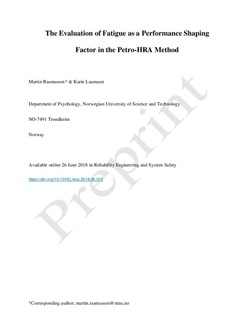| dc.contributor.author | Rasmussen, Martin | |
| dc.contributor.author | Laumann, Karin | |
| dc.date.accessioned | 2019-04-01T08:52:26Z | |
| dc.date.available | 2019-04-01T08:52:26Z | |
| dc.date.created | 2018-07-04T12:57:54Z | |
| dc.date.issued | 2018 | |
| dc.identifier.issn | 0951-8320 | |
| dc.identifier.uri | http://hdl.handle.net/11250/2592628 | |
| dc.description.abstract | In the development of the Petro-HRA method, a human reliability analysis (HRA) developed for the petroleum industry, a number of factors believed to effect human performance were reviewed and considered for inclusion in the method's performance shaping factor (PSF) taxonomy. The method was created for prospective risk analysis of post-initiator events and it was created as a method that focused on including the most important PSFs, rather than attempting to include all aspects of human performance. This paper assess whether fatigue should be among the PSFs included. This article presents: (1) how fatigue is included in current human reliability methods; (2) fatigue and its underlying aspects; (3) how these aspects affect performance and; (4) the consideration of including fatigue as a PSF in Petro-HRA. Four possible PSFs based on the causes of are suggested:Sleep deprivation, Shift-length, Non-day shift, and Prolonged task performance. However, due to the relative low impacts of the PSFs and the Petro-HRA's focus on only the strongest PSFs, the final method did not include any of the suggested fatigue PSFs. | nb_NO |
| dc.language.iso | eng | nb_NO |
| dc.publisher | Elsevier | nb_NO |
| dc.rights | Attribution-NonCommercial-NoDerivatives 4.0 Internasjonal | * |
| dc.rights.uri | http://creativecommons.org/licenses/by-nc-nd/4.0/deed.no | * |
| dc.title | The Evaluation of Fatigue as a Performance Shaping Factor in the Petro-HRA Method | nb_NO |
| dc.type | Journal article | nb_NO |
| dc.type | Peer reviewed | nb_NO |
| dc.description.version | acceptedVersion | nb_NO |
| dc.source.journal | Reliability Engineering & System Safety | nb_NO |
| dc.identifier.doi | 10.1016/j.ress.2018.06.015 | |
| dc.identifier.cristin | 1595622 | |
| dc.relation.project | Norges forskningsråd: 220824 | nb_NO |
| dc.description.localcode | © 2018. This is the authors’ accepted and refereed manuscript to the article. Locked until 26.6.2020 due to copyright restrictions. This manuscript version is made available under the CC-BY-NC-ND 4.0 license http://creativecommons.org/licenses/by-nc-nd/4.0/ | nb_NO |
| cristin.unitcode | 194,67,40,0 | |
| cristin.unitname | Institutt for psykologi | |
| cristin.ispublished | true | |
| cristin.fulltext | original | |
| cristin.qualitycode | 2 | |

